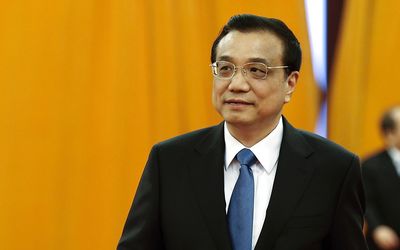China unveils mini stimulus to boost slowing economy
by Agency Staff,
2014-04-03 15:48:38.0
BEIJING — China has announced a set of steps to boost slowing growth in the world’s number-two economy, including extending tax breaks for small businesses and support measures for poor urban districts.
The State Council, China’s cabinet, announced the mini stimulus late on Wednesday after a meeting chaired by Premier Li Keqiang.
Anticipation has been building recently for some kind of action following a string of disappointing economic indicators, including on industrial production and consumer spending.
Mr Li said last month that China had set its annual growth target at "around" 7.5%, the same level as the goal for last year, after gross domestic product grew an annual 7.7% in 2013, the same as in 2012 — which was the slowest since 1999. "The State Council is responding to the growth slowdown by announcing tax breaks for SMEs (small and medium enterprises), speeding up investment in railways and rebuilding urban shantytowns," HSBC economists Qu Hongbin and Sun Junwei said in a report on Thursday.
"This time the package is small in scale, but it is more targeted and involves reforms on financing to secure funding," they said. "So this should help China to smooth growth without exacerbating financial stability risks." The tax breaks for "small and micro" companies will be extended until the end of 2016, the State Council said in a statement on the central government website.
It also said 6,600km of new railway lines will come into operation this year, 1,000km more than in 2013.
The plan will also see the creation of a railway fund that will receive between ¥200bn-¥300bn ($32bn-$48bn) each year, the statement said.
However, there was no mention of plans for monetary policy, such as a reduction in the amount of cash banks must keep in reserve, a cut in interest rates or a drive to get banks lending more.
Investors were unmoved by the announcement, with Shanghai’s benchmark composite index down 0.15% in the morning session.
The state-run Xinhua news agency quoted officials at the meeting as saying the government will take other steps this year including stimulating enterprises and boosting domestic consumption and employment. China’s leadership says it wants to transform the country’s growth model from an over-reliance on often wasteful investment, instead making private demand the driver for more sustainable development.
"These measures show that Premier Li’s government aims to stabilise short-term growth with policies which can enhance efficiency while avoiding future financial troubles," Bank of America Merrill Lynch economists Lu Ting and Sylvia Sheng said in a report on Wednesday.
"We believe these measures are the right policy responses to the ‘fiscal cliff’ as a consequence of the anti-corruption campaign, and we think markets will overall welcome them." Since becoming head of the ruling Communist Party in November 2012 and state president in March last year, Xi Jinping has mounted an austerity campaign among top officials and a highly publicised crackdown on corruption that has seen some high-ranking officials sacked or charged.
AFP

Chinese Premier Li Keqiang. Picture: REUTERS
BEIJING — China has announced a set of steps to boost slowing growth in the world’s number-two economy, including extending tax breaks for small businesses and support measures for poor urban districts.
The State Council, China’s cabinet, announced the mini stimulus late on Wednesday after a meeting chaired by Premier Li Keqiang.
Anticipation has been building recently for some kind of action following a string of disappointing economic indicators, including on industrial production and consumer spending.
Mr Li said last month that China had set its annual growth target at "around" 7.5%, the same level as the goal for last year, after gross domestic product grew an annual 7.7% in 2013, the same as in 2012 — which was the slowest since 1999. "The State Council is responding to the growth slowdown by announcing tax breaks for SMEs (small and medium enterprises), speeding up investment in railways and rebuilding urban shantytowns," HSBC economists Qu Hongbin and Sun Junwei said in a report on Thursday.
"This time the package is small in scale, but it is more targeted and involves reforms on financing to secure funding," they said. "So this should help China to smooth growth without exacerbating financial stability risks." The tax breaks for "small and micro" companies will be extended until the end of 2016, the State Council said in a statement on the central government website.
It also said 6,600km of new railway lines will come into operation this year, 1,000km more than in 2013.
The plan will also see the creation of a railway fund that will receive between ¥200bn-¥300bn ($32bn-$48bn) each year, the statement said.
However, there was no mention of plans for monetary policy, such as a reduction in the amount of cash banks must keep in reserve, a cut in interest rates or a drive to get banks lending more.
Investors were unmoved by the announcement, with Shanghai’s benchmark composite index down 0.15% in the morning session.
The state-run Xinhua news agency quoted officials at the meeting as saying the government will take other steps this year including stimulating enterprises and boosting domestic consumption and employment. China’s leadership says it wants to transform the country’s growth model from an over-reliance on often wasteful investment, instead making private demand the driver for more sustainable development.
"These measures show that Premier Li’s government aims to stabilise short-term growth with policies which can enhance efficiency while avoiding future financial troubles," Bank of America Merrill Lynch economists Lu Ting and Sylvia Sheng said in a report on Wednesday.
"We believe these measures are the right policy responses to the ‘fiscal cliff’ as a consequence of the anti-corruption campaign, and we think markets will overall welcome them." Since becoming head of the ruling Communist Party in November 2012 and state president in March last year, Xi Jinping has mounted an austerity campaign among top officials and a highly publicised crackdown on corruption that has seen some high-ranking officials sacked or charged.
AFP




















Change: -0.47%
Change: -0.57%
Change: -1.76%
Change: -0.34%
Change: 0.02%
Data supplied by Profile Data
Change: -1.49%
Change: -0.01%
Change: -0.47%
Change: 0.00%
Change: -0.08%
Data supplied by Profile Data
Change: 0.36%
Change: 0.84%
Change: 0.22%
Change: -0.22%
Change: 0.82%
Data supplied by Profile Data
Change: 0.28%
Change: -0.53%
Change: 0.20%
Change: -1.40%
Change: -1.88%
Data supplied by Profile Data